

“‘Romeo, Romeo, wherefore art thou Romeo?’ Dad, nobody talks like this!”
And so opines thirteen-year-old Susanna Shakespeare in the premiere episode of the Britcom Upstart Crow, which can be best described as the life of Shakespeare told in the style of Blackadder. Because it doesn’t matter that you’ve written what is arguably the most celebrated tragic romance. Your teenage spawn will still regard you as an embarrassing loser. To gain their respect, you must do something truly worthy, like the definitive portrayal of Dr. Doom.
Anyway, Will responds to this critique by pointing out that stage dialogue is expected to be poetic. He certainly couldn’t use the inarticulate mutterings that pass for conversation among Kids These Days, as that wouldn’t give his work a timeless quality. His father John declares that the only way they’re timeless is how they seem to go on forever. He found Henry VI Part I enough of a chore to sit through and is horrified that there’s more of the same.
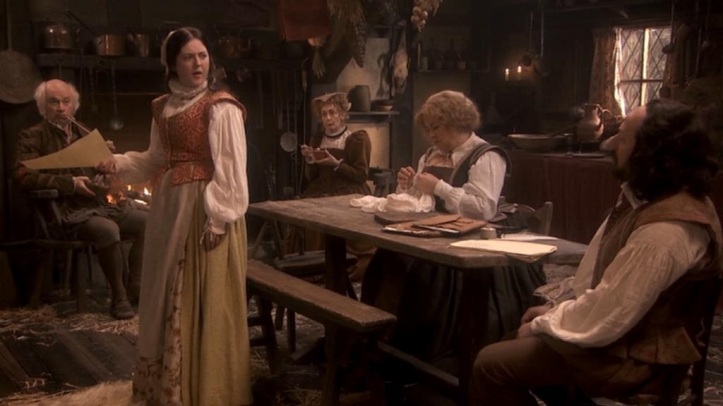
We then detour into the explanation (popular among smug poseurs) on how “Wherefore art thou” means “Why are you called” and not “Where are you” (which is what it sounds like to the untrained ear). This causes Will’s wife Anne to make a piercing observation:
Anne: If I was being really picky, Romeo is just his Christian name, isn’t it? And that’s not the issue. It’s his surname that’s the problem.
Will: (a bit abashed) Well, yes. Actually, I was sort of hoping people wouldn’t notice that.
Caught red-handed! Will then tries to extoll some of the humorous scenes, only for Anne to remark that comedy isn’t his strong point. Will is indignant, and claims that just because it requires abundant footnotes to follow the jokes doesn’t mean they’re not hilarious. But for now, he must head back to London.

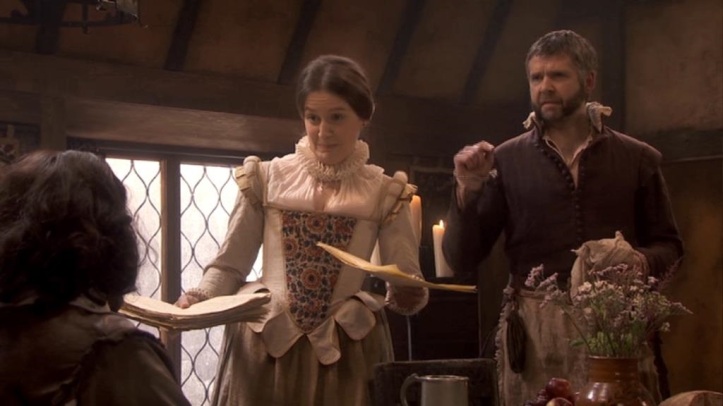
Our scene changes to the English capital, and it is here that we meet our two recurring characters who are completely fictitious. Kate is the daughter of the landlady of Will’s London lodgings. She’s really ambitious and wants more than anything to be in theater. However, at this time, it is illegal for women in England to do anything interesting, so she must stew in her frustrations. Think of her as a more able Lucy Ricardo.
Then there is the household servant Ned Bottom. To continue the comparison to Blackadder, Bottom is the Baldrick. However, he’s more like the Series 1 Baldrick who had a certain low cunning to him, rather than the bumbling moron that was presented later in the show’s run.
Upon arrival, Will proceeds to complain about the journey to London and its inept handling by the coach company. This and later such rants are a nod to the 1970s TV comedy The Fall and Rise of Reginald Perrin, the title character of which offered similar complaints regarding his work commute. But Kate couldn’t care less and wants to hear the juicy details of his new teen romance Romeo and Julian… erm, Juliet! Will expresses concerns over the casting of the female lead. He fears that a more experienced actor would be unconvincing as an ingenue. Yet he also finds the barely pubescent boys commonly used for such parts to be far too callow for his liking. Kate hints with little subtlety that maybe she could perform the role. Will reminds her that lady acting is illegal. Anyway, everyone knows that women can’t act.

They then receive an unwelcome visit from Sir Robert Greene, who slinks in like a panto blackguard and introduces himself thusly:
Greene: Master Shaky Poet, a word if you please?
Will: Shakespeare, Master Greene, my name is Shakespeare.
Greene: Yea, I know your name, sirrah. I was addressing you by trade. Shaky Poet. Just as I would address a house builder as Master Builder or a ship’s carpenter Master Carpenter.
Bottom: And what would you call a bear baiter, Master Greene?
Greene: Master Baiter.
Yeah, he walked straight into that one.
Out of all the historical persons to appear on the show, Greene is the one saddled with the most creatives liberties. His role as Will’s Sitcom Archnemesis is largely due to his writing the pamphlet “Greene’s Groats-Worth of Wit,” which is commonly regarded as a denouncing of Shakespeare as a playwright (also the source of the show’s title). However, he was never Master of the Revels (essentially the Elizabethan theater equivalent of the Hays Office), a post held by Sir Edmund Tylney at the time. What’s more, Greene died shortly after the publication of his infamous pamphlet, giving him little opportunity to harass Shakespeare.
Well, unless he became an undead abomination.
The reason for Greene’s visit concerns his nephew Florian. Florian had become infatuated with a knight’s daughter back home. His father does not approve of a match with someone of such lowly birth, so he sent him to Greene to host him until his semester at Cambridge begins a week hence. Greene wishes to foist this responsibility on Will and threatens to deny any licenses for his plays to be legally performed. Will responds to this with indignance.
Will: You mean you’re corruptly using your public position to further your own private interests?
Greene: Er, duh!
With no other options open, Will reluctantly accedes. Upon Greene’s departure, Will rants over how unfair it is that he should be subject to the whims of a man like Greene, who only holds his position thanks to being high born and a product of the Oxbridge system.
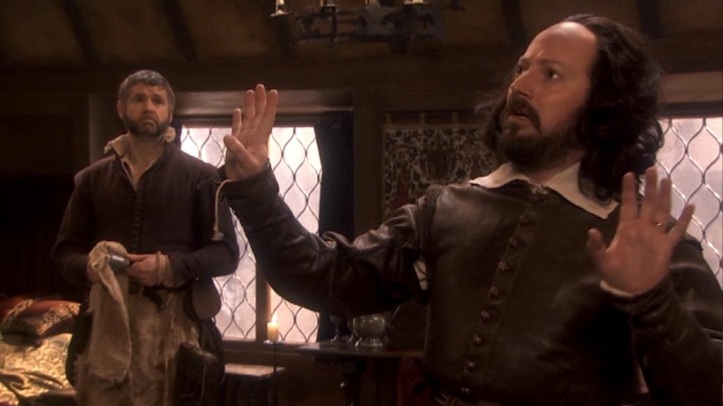
Will: It is almost as if there be suspended over this sceptered isle a ceiling made of glass, against which men of lower birth, such as I, must always bonk our noggins.
Bottom: Do you think that’s why you’re going a bit bald?
Will: I am not going bloody bald! I have a very big brain.
But first, he must visit the Red Lion Theatre to consult about Romeo and Juliet. Female role specialist Henry Condell is begging troupe leader Richard Burbage to seriously consider him for the role of Juliet. However, Burbage suspects Will would regard Condell as a bit too mature for portraying an ingenue of thirteen summers. And certainly Condell would make Norma Shearer’s take on the character look like Olivia Hussey in comparison. Comic actor William Kempe is even more derisive and reminds everyone how he’s experienced with proper commedia dell’arte rather than the lowbrow crap that passes for comedy in England.
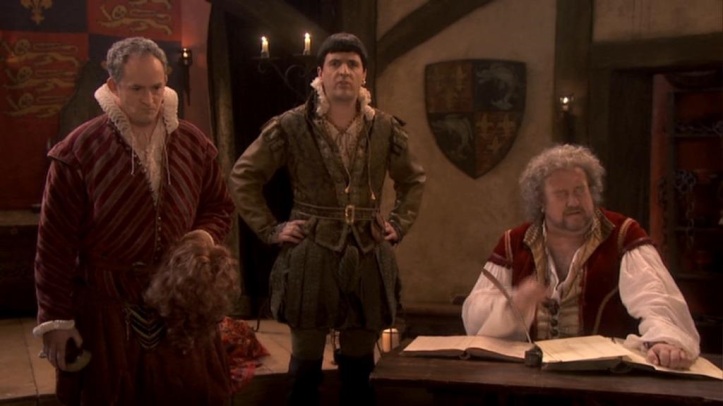
As an aside, Burbage, Kempe, and Condell were indeed real actors that Shakespeare worked with. Burbage himself was something of a megastar in the London theatrical scene, to the point where the public mourning of his death in 1619 overshadowed the same for Queen Anne which had occurred at about the same time. Kempe was an experienced comic actor in both commedia dell’arte and stage jigs. To reflect this in an anachronistic fashion, his mannerisms are modeled on Ricky Gervais. However, it is Condell who had the greatest impact on the Shakespeare legacy. For he was prominently involved in assembling many of Shakespeare’s plays in the First Folio, considered to have the most accurate renditions.
Will arrives and Condell proceeds to make his case in an increasingly hysterical manner, much to Kempe’s delight. However, Will informs them that the play won’t be ready anytime soon. He’s hit a creative block with Romeo, and just can’t seem to properly develop the character. But he’s considered lately that the traditional boy meets girl and they live happily ever after formula needs shaking up, so he intends to kill off the young lovers in the conclusion. Burbage regards this as box office poison and seeks to dissuade Will. However, he’s dead set on his subversion as soon as he gets over his current doldrums.
Back at his lodgings, Will finds that Florian has been delivered trussed up in a sack. Upon freeing him, Florian bemoans having been separated from his true love Rosaline. While Bottom finds this tiresome, for Will it’s a goldmine of material to help him flesh out Romeo.
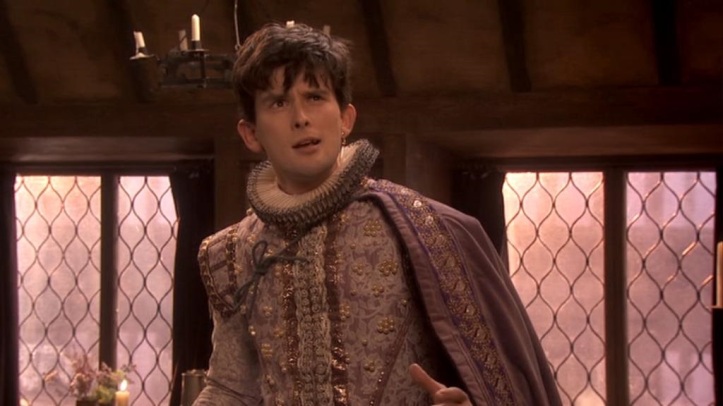
Unfortunately, upon setting eyes on Kate, Florian quickly becomes enamored and proposes marriage. This is a disaster in the making. If Florian’s father considered a knight’s daughter too low-born, an outright commoner would be completely unacceptable. Matters aren’t helped by Kate egging him on, as she sees this as a rare opportunity for upward social mobility. Adding insult to injury as far as Will is concerned, she uses lines from his unfinished play to entice Florian. Kate eventually relents once Will promises to let her have a title role in Romeo and Juliet once it’s completed.
Even so, it proves difficult to cool Florian’s ardor, and all attempts to dissuade him fall short. It gets to the point where he becomes rather unseemly about pressing his suit towards Kate.
Florian: I shall stand beneath Kate’s balcony and strum my lute.
Bottom: If that’s a figure of speech, don’t let the watchman catch you.
Florian: Oh well. In that case, perhaps I’ll just play her some music.
Clearly, the only way to end this is to have Florian believe that Kate is dead. Will acquires a concoction that will simulate death for Kate to imbibe. Upon confirming her lifeless state, Florian will feel free to pursue other romantic interests. What could possibly go wrong?

How about Florian taking Kate’s supposed death rather harder than Will predicted and committing suicide? This is an utter disaster, and it’s hard to see how it could get much worse. Fortunately, Will takes a glancing blow from an inspiration particle that, about four hundred years later, would strike true on Robert Klane and cause him to write Weekend at Bernie’s. Upon Greene arriving to collect Florian, he’s easily fooled into believing that his nephew is just recovering from a hard night of carousing.
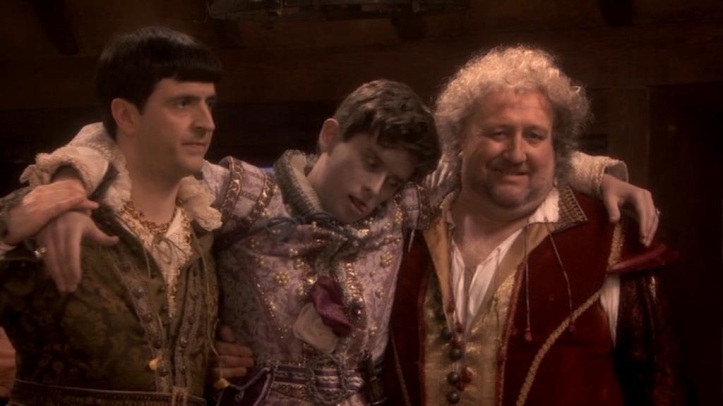

Having returned to Stratford-upon-Avon, Will recounts all this to Anne. He concludes that, even in his current state, Florian will still be a typical member of the English Establishment. Now if only he could come up with a decent climax for his teen romantic tragedy.
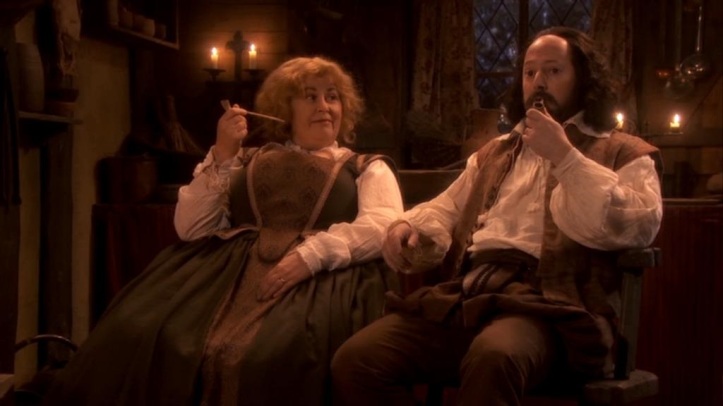
And that sets the tone of Upstart Crow. This premiere sets the pattern for future episodes. There is always a specific play that will help inform the core plot, with allusions to other plays thrown in the mix, and Robert Greene serving as the antagonist in most instances. But rather than have one come on top every time, sometimes Will triumphs while other times it is Greene who wins.
Plots can range from Will failing to convince anyone that Hamlet is not supposed to be a comedy to him gaming an awards ceremony so that he’s the only nominee in his categories to creating the first ever musical using the madrigals of Thomas Morley (who gets portrayed as a Bono-style tax evader). And of course, Kate gets to star in Romeo and Juliet (if not the way she originally imagined).
While the bulk of the recurring cast have been introduced in the premiere, two others are featured later. The first is playwright Christopher Marlowe, who gets somewhat modeled on Lord Flashheart from Blackadder (though he’s considerably less of a jerk). He’s also part of a Take That directed at the sad sack chumps who insist on believing that a grammar school dropout from the Midlands couldn’t possibly be more talented than a bunch of Oxbridge posh boys. A running gag through the first series has Shakespeare writing the plays attributed to Marlowe (admittedly the least stupid anti-Stradfordian candidate for writing Shakespeare’s plays). The other is Miss Lucy, who is inspired by a person known as Lucy Negro. The documentation on her is sparse and, despite her name, it’s not that certain if she was originally from Africa. But she could have been, so why not?
If you want to check it out yourself, it’s available for streaming on Britbox. If you prefer physical media, the entire TV series and the two Christmas specials can be had on DVD. However, many of the sets in circulation are Region 2. So unless you have a region free player, be sure to read all the details in the entry.